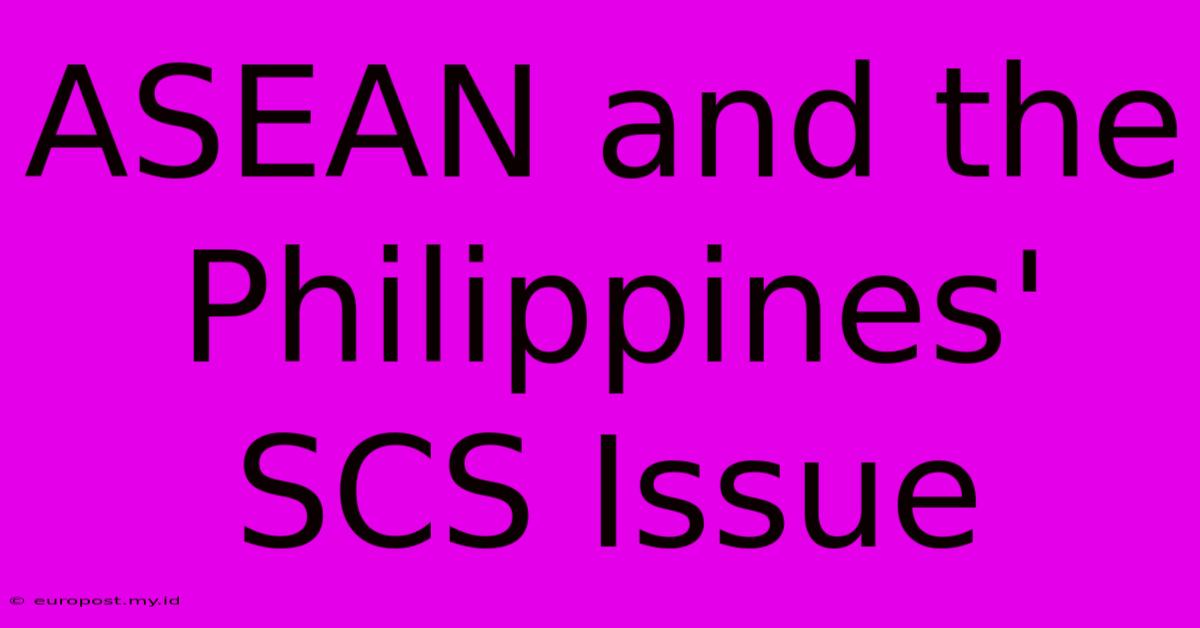ASEAN And The Philippines' SCS Issue

Discover more in-depth information on our site. Click the link below to dive deeper: Visit the Best Website meltwatermedia.ca. Make sure you don’t miss it!
Table of Contents
ASEAN and the Philippines' South China Sea Issue: Navigating a Complex Geopolitical Landscape
The South China Sea (SCS) has become a focal point of geopolitical tension, with the Philippines playing a crucial role due to its proximity to disputed territories. Understanding the dynamics between the Association of Southeast Asian Nations (ASEAN) and the Philippines regarding this issue is critical to grasping the complexities of the region. This article delves into the challenges and opportunities facing both ASEAN and the Philippines in navigating this precarious maritime environment.
The Philippines' Claims and Concerns
The Philippines' claims in the SCS stem primarily from its exclusive economic zone (EEZ) as defined by the United Nations Convention on the Law of the Sea (UNCLOS). The country's claim encompasses areas rich in resources, including fishing grounds and potential hydrocarbon reserves. However, these claims overlap significantly with those of China, leading to considerable friction.
The Scarborough Shoal Dispute: A Turning Point
The 2012 standoff at Scarborough Shoal (Panatag Shoal) highlighted the precariousness of the situation. China's assertive actions, effectively barring Filipino fishermen from accessing traditional fishing grounds, underscored the challenges faced by the Philippines in asserting its rights. This incident fueled a significant escalation in tensions and brought the issue to the forefront of international attention.
The Landmark Arbitral Ruling
In 2016, the Permanent Court of Arbitration (PCA) delivered a landmark ruling in favor of the Philippines, invalidating China's expansive nine-dash line claim. This ruling, while legally binding on the Philippines and China, has not been fully accepted by China, further complicating the issue. The ruling provided a legal basis for the Philippines' claims, but enforcing it remains a significant challenge.
ASEAN's Role: Balancing Act and Collective Approach
ASEAN, as a regional organization, has attempted to manage the SCS dispute through various mechanisms, including the Code of Conduct (COC) negotiations. The COC aims to establish a framework for managing disputes peacefully and preventing further escalation. However, progress has been slow, hampered by differing national interests and China's considerable influence within the organization.
Challenges for ASEAN
ASEAN's approach has faced significant hurdles. The principle of non-interference in the internal affairs of member states often limits the organization's ability to address China's actions directly. Furthermore, the diversity of interests among ASEAN member states, some of whom maintain close ties with China, complicates the formation of a united front.
ASEAN's Strengths: Dialogue and Regional Cooperation
Despite these challenges, ASEAN offers a platform for dialogue and diplomatic engagement. The continued negotiation of the COC, however slow, represents a commitment to resolving the issue through peaceful means. Furthermore, ASEAN's focus on regional cooperation provides opportunities for collaborative efforts in areas like maritime security and environmental protection, potentially mitigating some of the negative impacts of the SCS dispute.
The Philippines' Strategic Approach: Strengthening Alliances
The Philippines has actively sought to strengthen its alliances with external partners, particularly the United States and its allies, to counter China's assertive actions in the SCS. These alliances provide crucial diplomatic and, potentially, military support.
Enhanced Defense Cooperation: A Key Strategy
The Philippines has focused on modernizing its military capabilities and enhancing defense cooperation with its allies. This includes joint military exercises and agreements on information sharing, aiming to enhance its ability to protect its maritime interests and respond to potential threats.
Navigating the Balancing Act: A Delicate Approach
The Philippines faces a delicate balancing act. It needs to maintain strong economic ties with China while simultaneously protecting its sovereign rights and interests in the SCS. This requires a nuanced approach that combines diplomacy, legal recourse, and strategic partnerships.
Conclusion: A Path Towards Peaceful Resolution
The SCS dispute remains a complex and sensitive issue. The relationship between ASEAN and the Philippines is crucial in navigating this challenge. While ASEAN's approach has its limitations, its commitment to dialogue and regional cooperation offers a vital framework for peaceful resolution. The Philippines' strategic partnerships and focus on enhancing its defense capabilities are critical elements in safeguarding its interests. Ultimately, a sustained commitment to diplomacy, international law, and regional cooperation is essential to finding a lasting and peaceful solution to this ongoing geopolitical challenge. The future stability of the region hinges on the success of these efforts.

Thank you for taking the time to explore our website ASEAN And The Philippines' SCS Issue. We hope you find the information useful. Feel free to contact us for any questions, and don’t forget to bookmark us for future visits!
We truly appreciate your visit to explore more about ASEAN And The Philippines' SCS Issue. Let us know if you need further assistance. Be sure to bookmark this site and visit us again soon!
Featured Posts
-
Business Intelligence Software Market Update
Nov 16, 2024
-
Martin Fourth Bagnaia On Pole In Barcelona
Nov 16, 2024
-
Fernandes Amazed By Ronaldos Skill
Nov 16, 2024
-
Indias Six Fest Varma And Samsons Feat
Nov 16, 2024
-
Weigh In Results Ufc 309 Jones Vs Miocic
Nov 16, 2024
